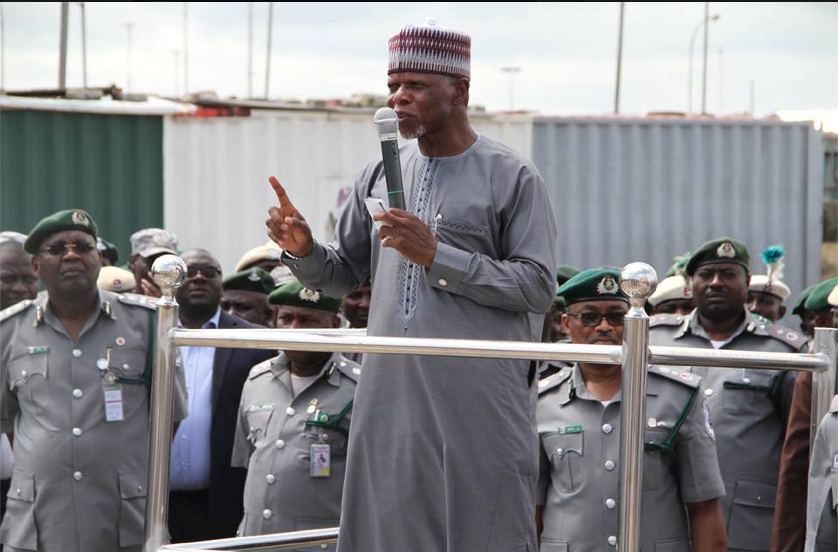The Federal Government on Wednesday announced the reduction in revenue expected from the Nigeria Customs Service from N1.5tn to N943bn.
The Minister of Finance, Zainab Ahmed, made the announcement in a meeting between the executive arm of government and the leadership of the National Assembly in Abuja.
The meeting, according to a statement by the Senate President media office, was meant to review the 2020 budget and Medium Term Expenditure Framework against the background of the impact of the coronavirus pandemic on the global economy.
The finance minister confirmed a review of the budget oil benchmark from $57 to $30 per barrel.
She stated that this was done to prepare for the worst-case scenario as well as insulate the Nigeria economy against any form of unexpected crisis.
Ahmed also told the leadership of the National Assembly that budgeted revenues for the Nigeria Customs Service had been reduced from N1.5tn to N943bn due to anticipated reduction in trade volumes.
She added the privatisation proceeds would be cut by 50 per cent based on the adverse economic outlook on sales of the Independent Power Projects and other assets.
The Federal Government is targeting to generate about N252.08bn from privatisation proceeds in the 2020 fiscal period.
The N252.08bn represents an increase of N42.08bn over the N210bn which was approved in the 2019 fiscal period.
On the other hand, the Bureau of Public Enterprises said in February that it planned to generate total net revenue of N266.8bn from the sale of public assets to support the implementation of the 2020 budget.
It said the transactions would include the completion of the sale of Yola Electricity Distribution Company, Afam Power Limited and Afam Three Fast Power; and the sale of Tafawa Balewa Square, Bank of Agriculture, Dowell Schlumberger Nigeria Limited, NMC houses, Nigeria Commodity Exchange, River Basin Development Authorities and Lagos International Trade Fair complex.
Ahmed disclosed that the Federal Government had undertaken cuts to revenue-related expenditures for the Nigerian National Petroleum Corporation for several projects included in the 2020 Appropriation Act passed by the National Assembly in December 2019.
She said, “The Federal Government is working on Fiscal Stimulus Measures to provide fiscal relief for taxpayers and key economic sectors.
“We will incentivise employers to retain and recruit staff during the economic downturn.
“We will stimulate investment in critical infrastructure; review non-essential tax waivers to optimise revenues, and complement monetary and trade interventions to respond to the crisis.”
Ahmed further disclosed that the Federal Government would release N6.5bn in two tranches (N1.5bn and N5bn) to the National Centre for Disease Control as an intervention to assist in the fight against the spread of the COVID-19 disease in Nigeria.
Also, she stated that the Lagos State Government would receive financial support of N10bn from the Federal Government to combat coronavirus spread in the state.
In addition, she informed the lawmakers that Nigeria had received a grant of $18.2m from Japan for strengthening seven NCDC centres across the country.
The finance minister said N1bn would be released by the government to pharmaceutical firms in the country.
Ahmed also explained that “prior to COVID-19 and oil price decline, the Nigerian economy was already fragile and vulnerable.”
The minister said the development had put “increasing pressure on the naira and foreign reserves as the crude oil sales receipts decline and the country’s micro-economic outlook worsens.”
The Governor of the Central Bank of Nigeria, Godwin Emefiele, said the proposed measures would depend on how fast the nation was able to address the pandemic.
The President of the Senate, Ahmad Lawan, who presided over the meeting, said the National Assembly would review the MTEF/FSP in the bid to study and approve the proposed measures being sought by the executive arm of government.
Lawan said, “If we have to review the budget itself, we have to consider the MTEF/FSP.
“Even in sickness, we need government to provide services.
“The impact of COVID-19 is well known to all of us in terms of health and the economy.
“Here, we will be talking of revenues that we estimated to fund the budget 2020.”
The Speaker of the House of Representatives, Femi Gbajabiamila, said the meeting was very timely.
Members of the National Assembly leadership present at the meeting included Deputy Senate President, Ovie Omo-Agege and Deputy Speaker, Idris Wase.
FG decrease N1.5tn Customs revenue target to N943bn
Sign in
Welcome! Log into your account
Forgot your password? Get help
PRIVACY POLICY PAGE
Password recovery
Recover your password
A password will be e-mailed to you.












